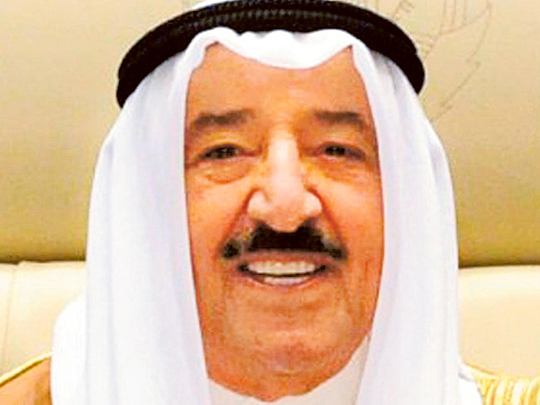
Manama: Kuwait’s Emir Shaikh Sabah Al Ahmad Al Jaber Al Sabah flies to Iran on Sunday on a two-day visit amid high expectations the trip would smooth over strained relations between the two shores of the Arabian Gulf.
Kuwaiti media speculated that the visit by the emir whose country chairs the Gulf Cooperation Council (GCC) and the Arab League Summit would be a breakthrough in several deadlocked issues, mainly in Iraq, Syria and the Gulf region, and would help address violence and acts of terrorism.
Iran’s ambassador to Kuwait Ali Riza on Saturday told Kuwait News Agency (Kuna) that the visit would be historic in the relations between the two countries.
“The visit comes in the midst of delicate developments and complex changes in the eventful region that resulted in the political turmoil in some countries,” the ambassador said. “Iran is keen on enhancing mutual trust and political relations with neighbouring countries, especially Kuwait,” he said, quoted by Kuna.
The emir’s visit will herald a new era of cooperation and will have an impact on the present and future of the entire region he added.
“It will contribute to address several issues in the region amidst hope we will have a brighter future for the region filled with compassion, fraternity and co-existence,” he said.
Kuwait’si Ambassador in Tehran Majdi Al Dhafiri said the emir’s visit to Iran was “vital in tackling issues connected with the region.”
“Iran is an important country in the region and Kuwait’s relation with Iran is based on mutual respect and cooperation,” Dhafiri said, quoted by Kuna.
However, away from diplomatic statements, Kuwaitis want to see concrete results for the “critically significant” visit.
“Since this visit is crucial, do not let it fail because of Iran’s diplomacy, known for its double standards: Tough line in Qum and softer approach in Tehran,” Dhafer Mohammad Al Ajmi, CEO of the Gulf Monitoring Group, an independent Kuwait-based research centre, said. “The visit by Shaikh Sabah accompanied by an important delegation, including ministers of foreign oil and finance, trade and industry and the announcement of the intention to sign agreements and memoranda relating to air transport, tourism and sport and two agreements in the field of work, should prompt Tehran to respond in the best manner,” he said in an editorial he wrote ahead if the visit.
Al Dhafiri said that bilateral relations have been difficult, due mainly to the Gulf dimension of Kuwait.
“Kuwait is member of the Gulf Cooperation Council (GCC) to which Iran has wanted to export its revolution. Kuwait is part of the Gulf over which Iran wants to spread its hegemony. Kuwait is also member of the Gulf into whose domestic affairs Iran wants to interfere, either through spy rings or through incitement. Now, Shaikh Sabah wants to start a new page in the relations, refusing the claim that it is useless to extend a hand to Tehran,” he said.
According to the Kuwaiti analysts, the emir’s visit is in response to the recent positive developments in the region that should provide new opportunities for peace and stability.
“The premise on which relations should be built is that there are no disputes that should result in severing ties with Iran. The political change at the top and the emergence of a new president who is more moderate than his predecessor have sent positive signals and created a more optimistic mood. The visit is also taking place after the 5+1 accord about Iran’s nuclear programme and at a time when Saudi Arabia said that it looked forward to relations with Iran based on mutual respect.”
Al Dhafiri added that US President Barack Obama’s “unsteady policies” have pushed Kuwait to move forward towards reconciliation with Iran in order to avoid “reconciliations imposed by the West.”
“The visit could help address the issues between Iran and Saudi Arabia as well as between Iran and Bahrain and Iran and the UAE,” he said.











